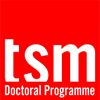240 ECTS
195h
Programme / Syllabus
Core courses
Advanced quantitative methods
PRESENTATION AND INTENDED LEARNING OUTCOMES
A) Course description
The course will cover empirical techniques that form the basis for quantitative research in management. The module is therefore design to introduce students to some of the core issues associated with empirical research through the review of some recent trends in research. The module will comprise a mixture of faculty-led lectures, interactive student-led presentations, and discussions.
B) Upon completion of the course, students should be able to:
- Identify tools and resources: Data, statistical packages, tutorials and doctoral seminars, MOOC
- Compare different quantitative research methods for designing a research project in business and management
- Survey concrete scientific application of the quantitative method in a top-tier peer-reviewed journals
- Point out possible challenges, in particular challenges for the validity, indentification, causality, diff-in-diff
- Specify prerequisites, conditions, guidelines for implementation
RESEARCH SKILLS
- Knowledge and intellectual abilities: Research methods; Academic literacy and management; Problem-solving.
- Personal effectiveness: Integrity; Perseverance; Responsibility; Reputation.
- Research governance and organisation: Ethics; Research strategy; Project planning and delivery.
- Engagement, influence and impact: Team working; Leadership; Communication methods; Communication media.
Advanced qualitative methods
PRESENTATION AND INTENDED LEARNING OUTCOMES
A) Course description
A researcher needs to master the use of several methodologies in order to deeply understand studies in their field and to choose and to employ the most accurate method to answer their addressed research questions. The purpose of this course is to develop participants’ ability of reflective stance, supported by theory, and to be able to use qualitative research design and tools.
This course will cover four main topics: (1) Issues and challenges of qualitative inquiry in management research, (2) Core methods and practicalities of qualitative inquiry in management research, (3) Qualitative data analysis, (4) Ethical research practice. The pedagogical approach will be based on active learning. Students will have to read research articles before some of the classes. This material will then be discussed and analyzed collectively. Participation in the course is required and based on the quality and quantity of discussion contributions. The final assessment consists in a written final examination related to a previous exercise.
B) Upon completion of the course, students should be able to:
- Identify and formulate appropriate qualitative research questions and interview questions
- Analyze the main qualitative research methods
- Assess different styles of presenting qualitative research findings
- Develop an interpretive understanding of data collected
- Collect and use qualitative data
RESEARCH SKILLS
- Knowledge and intellectual abilities: Research methods; Language; Problem solving; Argument construction.
- Personal effectiveness: Self-reflection; Self-conficence; Time management; Integrity.
- Research governance and organisation: Ethics; Research strategy; Project planning and delivery.
- Engagement, influence and impact: Collegiality; Communication media; Communication methods.
Intellectual property rights
PRESENTATION AND INTENDED LEARNING OUTCOMES
A) Course description
This session will introduce students to intellectual property rights and more especially to main principles of copyright and application to the thesis.
B) Upon completion of the course, students should be able to:
- Survey the intellectual property law: Interests, justifications, composition
- Analyze rights of the authors
- Describe main principles of copyright and application to the PhD thesis
RESEARCH SKILLS
- Knowledge and intellectual abilities: Academic literacy; Intellectual insight.
- Personal effectiveness: Integrity; Reputation.
- Research governance and organisation: Ethics; Appropriate practice.
- Engagement, influence and impact: Global citizenship.
Track specific courses
Asset pricing and financial markets 2
PRESENTATION AND INTENDED LEARNING OUTCOMES
A) Course description
This course covers the latest theoretical, experimental and empirical research in asset pricing and financial markets. It focuses on selected issues that will be analyzed in depth, from theory to evidence, with the dual objective to cover the issue and to present various methodologies.
Topics covered are three-fold.
The first part deals with questions of information aggregation in financial markets (18 hours). The second part focuses on the design and interpretation of the results of some experiments in asset pricing (6 hours). The third part deals with behavioural issues in portfolio choices and asset pricing (6 hours).
The first objective of the course is to familiarize students with some of the most important research strands and recent advances in the field. The second objective is to put students in a position to conduct their own independent research in the field by providing them with the necessary methodological tools.
B) Upon completion of the course, students should be able to:
- Identify key frictions that prevent the efficient aggregation of information in markets prices.
- Explain how such frictions can be captured in a mathematical model of trade with asymmetric information.
- Solve the corresponding models discussed in class.
- Describe the various categories of experiments
- Evaluate whether an experimental design is suited to test a specific theoretical prediction
- Evaluate portfolio choices and asset prices in light of recent insights in behavioral finance
- Assess the impact of fintech on individual investors and financial markets
RESEARCH SKILLS
- Knowledge and intellectual abilities: knowledge base; cognitive abilities, creativity, abstraction
- Personnel effectiveness: integrity; time management; perseverance, commitment to research
- Research governance and organization: project planning and delivery; ethics, appropriate practice
- Engagement, influence, impact: communication and dissemination; working with others
Corporate finance and financial intermediation 2
PRESENTATION AND INTENDED LEARNING OUTCOMES
A) Course description
This course covers the latest in Corporate Finance and Financial Intermediation. It focuses on selected issues that will be analyzed in depth, from theory to evidence, with the dual objective to cover the issue and to present various methodologies.
The first objective of the course is to familiarize students with some of the most important research strands and recent advances in the field; given the volume of recent work, the course is necessarily incomplete, but the three parts thrives to be representative. The second objective is to put students in a position to conduct their own independent research in the field by providing them with the necessary methodological tools.
The course consists of 3 parts, each taught for 5 sessions of 3 hours (for a total of 45 hours), one on Theoretical Corporate Finance (Andrea Attar), a second one on Financial Intermediation and Fintech (Matthieu Bouvard), and the third one on Empirical Corporate Finance (Ulrich Hege).
B) Upon completion of the course, students should be able to:
- Identify frictions in capital markets and assess how these frictions shape an economic environment (firms, financial intermediaries, regulators, institutions)
- Evaluate which model is best suited to capture these frictions
- Solve the models discussed in class
- Evaluate a model's contribution relative to the existing literature
- Formulate empirical predictions from a theoretical model
- Evaluate an empirical design and the validity of an identification strategy
- Propose empirical strategies to test the results of a model
- Evaluate the relevance of new research ideas in corporate finance and financial intermediation
RESEARCH SKILLS
- Knowledge and intellectual abilities: knowledge base, cognitive abilities, abstraction.
- Personnel effectiveness: integrity, time management; perseverance, commitment to research
- Research governance and organization: project planning and delivery, ethics, appropriate practice
- Engagement, influence, impact: communication and dissemination.
Research training seminars
PRESENTATION AND INTENDED LEARNING OUTCOMES
A) Description
These seminars are open to all students from TSM-DP 2nd year. The purpose of this module is to provide students with a broadly based overview of current research skills to write your PhD dissertation.
B) Upon completion of the course, students should be able to:
- Identify mobility grants
- Discover the international job market conference
- Compare academic posters and analyse poster sessions
- Design a poster and resources to help with poster design
- Improve networking skills
RESEARCH SKILLS
- Knowledge and intellectual abilities: Inquiring mind; Argument construction
- Personal effectiveness: Networking; Career management; Responsiveness to opportunities
- Research governance and organisation: Funding; Research strategy; Appropriate practice
- Engagement, influence and impact: Communication methods; Communication media; Collegiality
Teachers' pedagogical practices
PRESENTATION AND INTENDED LEARNING OUTCOMES
A) Description
It is a requirement of TSM that all PhD students who undertake any teaching duties should have attended the teachers' pedagogical practices which is designed for Postgraduate Teaching Assistants. The aim of this workshop is to address some of the basic skills and understanding teaching assistants will need for their work. It assumes that participants have little or no previous teaching experience.
B) Upon completion of the course, students should be able to:
- Draw on an inventory of best experiences
- Review best practices with senior instructors
- Diagnose recurring pedagogical issues
- Role-play a 30-minute lecture
RESEARCH SKILLS
- Knowledge and intellectual abilities: Argument construction; Innovation
- Personal effectiveness: Career management; Continuing professional development; Reputation; Integrity
- Research governance and organisation: Ethics; Appropriate practice
- Engagement, influence and impact: Teaching; People management; Mentoring; Influence and leadership; Communication methods






